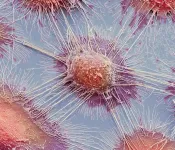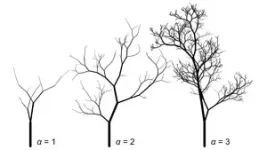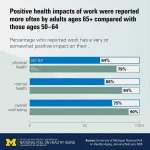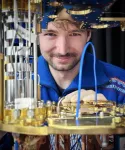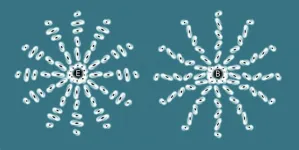The immune system plays a key role in detecting and destroying cancer cells. Cancer immunotherapy works by programming immune cells to recognize and eliminate cancer cells. However, many cancers can escape immune surveillance through various mechanisms, resulting in resistance to treatment. This highlights the need to better understand the molecular processes that enable immune evasion.
The tumor microenvironment (TME)—the space surrounding a tumor—plays a critical role in interactions between cancer and immune cells. Cancer cells can reshape the TME to their advantage, weakening tumor-infiltrating lymphocytes (TILs), the immune cells that attack tumor. Mitochondria, also known as the ‘powerhouse of the cell,’ are small organelles that produce energy for various cellular processes. They play a significant role in the metabolic reprogramming of cancer cells and TILs. However, precise mechanisms underlying mitochondrial dysfunction and its impact on the TME are poorly understood.
To address this knowledge gap, a team of researchers led by Professor Yosuke Togashi from Okayama University, Japan, has uncovered novel insights into mitochondrial dysfunction in cancer immune evasion. Working alongside Tatsuya Nishi and Tomofumi Watanabe from Okayama University, as well as Hideki Ikeda, Katsushige Kawase, and Masahito Kawazu from the Chiba Cancer Center Research Institute, the team identified mitochondrial transfer as a key mechanism of immune evasion. This study was published online in Nature on January 22, 2025. Prof. Togashi explains, “We have discovered mitochondrial transfer as one of the key mechanisms of immune evasion. Our research adds a new dimension to the understanding of how tumors resist immune responses, potentially leading to the development of more comprehensive and tailored approaches in treating different cancers.”
Mitochondria carry their own DNA (mtDNA), which encodes proteins crucial for energy production and transfer. However, mtDNA is prone to damage, and mutations in mtDNA can promote tumor growth and metastasis. In this study, the researchers examined TILs from patients with cancer and found that they contained the same mtDNA mutations as the cancer cells. Further analysis revealed that these mutations were linked to abnormal mitochondrial structures and dysfunction in TILs.
Using a fluorescent marker, the researchers tracked mitochondrial movement between cancer cells and T cells. They found that mitochondria were transferred via direct cell-to-cell connections called tunneling nanotubes, as well as through extracellular vesicles. Once inside T cells, the cancer-derived mitochondria gradually replaced the original T cell mitochondria, leading to a state called ‘homoplasmy,’ where all mtDNA copies in the cell are identical.
Normally, damaged mitochondria in TILs are removed through a process called mitophagy. However, mitochondria transferred from cancer cells appeared to resist this degradation. The researchers discovered that mitophagy-inhibiting factors were co-transferred with the mitochondria, preventing their breakdown. As a result, TILs experienced mitochondrial dysfunction, leading to reduced cell division, metabolic changes, increased oxidative stress, and impaired immune response. In mouse models, these dysfunctional TILs also showed resistance to immune checkpoint inhibitors, a type of immunotherapy.
By identifying mitochondrial transfer as a novel immune evasion mechanism, this study opens new possibilities for improving cancer treatment. Blocking mitochondrial transfer could enhance immunotherapy response, particularly in patients with treatment-resistant cancers.
Cancer therapies often involve high costs and significant side effects, particularly when they are ineffective. Enhancing the success of immunotherapy by inhibiting mitochondrial transfer could reduce the burden of cancer and improve patient outcomes.
Prof. Togashi concludes by saying, “Existing cancer treatments are not universally effective, and there is a pressing need for new therapies that can overcome resistance mechanisms. Developing drugs that inhibit mitochondrial transfer between cancer cells and immune cells may enhance the efficacy of immunotherapies, thereby providing personalized treatment options for patients with cancers that are resistant to current therapies.”
This discovery offers exciting new insights into cancer biology and could pave the way for more effective therapies in the future.
About Okayama University, Japan
As one of the leading universities in Japan, Okayama University aims to create and establish a new paradigm for the sustainable development of the world. Okayama University offers a wide range of academic fields, which become the basis of the integrated graduate schools. This not only allows us to conduct the most advanced and up-to-date research, but also provides an enriching educational experience.
Website: https://www.okayama-u.ac.jp/index_e.html
About Professor Yosuke Togashi from Okayama University, Japan
Yosuke Togashi is a Professor at the Graduate School of Medicine, Dentistry and Pharmaceutical Sciences, Okayama University, Japan. He completed his MD from Kyoto University and PhD from Kindai University. His research interests include respiratory medicine, lung cancer, cancer Immunology, and tumor biology. He is an esteemed member of several cancer societies and associations. Prof. Togashi is a recipient of various prestigious young investigator awards in cancer biology and immunology. He has authored over 130 research papers in various international peer-reviewed journals.
END
